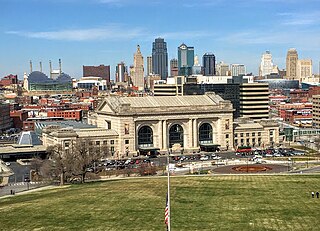
Downtown Kansas City is the central business district (CBD) of Kansas City, Missouri and the Kansas City metropolitan area employment as of 2010. It has 39,330 jobs as of 2012-2016, according to US census tract data. It is between the Missouri River in the north, to 31st Street in the south; and from the Kansas–Missouri state line eastward to Bruce R. Watkins Drive as defined by the Downtown Council of Kansas City; the 2010 Greater Downtown Area Plan formulated by the City of Kansas City defines the Greater Downtown Area to be the city limits of North Kansas City and Missouri to the north, the Kansas–Missouri state line to the west, 31st Street to the south and Woodland Avenue to the east. However, the definition used by the Downtown Council is the most commonly accepted.

The Midtown Exchange is a historic structure and mixed-use building located in the Midtown neighborhood of Minneapolis, Minnesota, United States. It is the second-largest building in Minnesota in terms of leasable space, after the Mall of America. It was built in 1928 as a retail and mail-order catalog facility for Sears, which occupied it until 1994. It lay vacant until 2005, when it was transformed into multipurpose commercial space. The building is listed on the National Register of Historic Places as the Sears, Roebuck and Company Mail-Order Warehouse and Retail Store.

The Library District is an officially designated neighborhood in Downtown Kansas City, Missouri, United States, roughly bounded by 9th and 11th Streets on the north and south and Main Street and Broadway on the east and west. The District contains a sub-district named the West Ninth Street/Baltimore Avenue Historic District listed on the National Register and which includes several buildings individually listed on the National Register of Historic Places. It also contains other notable structures not listed on the National Register.

The Kansas City Museum is located in Kansas City, Missouri, United States. In 1910, the site was built by lumber baron and civic leader Robert A. Long as his private family estate, with the four-story historic Beaux-Arts style mansion named Corinthian Hall. In 1940, the site was donated by Long's heirs to become a public museum. Seventy-five years later, it began extensive renovation.

The Stuber–Stone Building is located at 4221–4229 Cass Avenue in Detroit, Michigan. It was listed on the National Register of Historic Places in 1996. It is now known as the Stuberstone Lofts.

The New Amsterdam Historic District is a historic district located in Detroit, Michigan. Buildings in this district are on or near three sequential east-west streets on the two blocks between Woodward Avenue and Second Avenue. It was listed on the National Register of Historic Places in 2001.

Young's Market Company Building built in 1924 is a historic building located at 1610 West 7th Street, corner South Union Avenue, in the Westlake neighborhood of Los Angeles, California.

The Park Avenue Historic District is a historic district located in Detroit, Michigan, along Park Avenue between Adams St. and I-75. The district includes the Women's City Club, the Detroit Building, and the Park Avenue House. The district was designated a Michigan State Historic Site in 1996 and listed on the National Register of Historic Places in 1997.
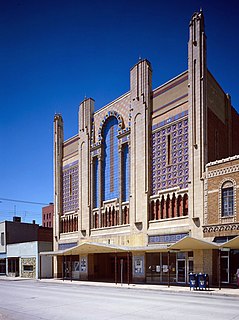
The Missouri Theater is a theater located in St. Joseph, Missouri. Completed in July 1927, the Missouri Theater was built as a cinema in the atmospheric style, using a combination of Art Deco and Moorish detailing.

The Western Auto Building, first known as the Coca-Cola Building or the Candler Building, after owner Asa Griggs Candler, is located at 2107 Grand Boulevard, in the Crossroads neighborhood of Kansas City, Missouri. It was built in 1914. Later it served as the headquarters of the Western Auto Supply Company, and became known by that association, especially when the company put a multi-story lighted sign on top of the building.
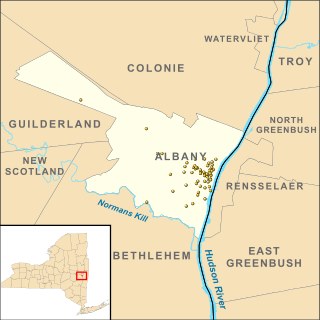
There are 75 properties listed on the National Register of Historic Places in Albany, New York, United States. Six are additionally designated as National Historic Landmarks (NHLs), the most of any city in the state after New York City. Another 14 are historic districts, for which 20 of the listings are also contributing properties. Two properties, both buildings, that had been listed in the past but have since been demolished have been delisted; one building that is also no longer extant remains listed.

The Crescent Warehouse Historic District is a 10.5-acre (4.2 ha) historic district in Downtown Davenport, Iowa, United States. The district is a collection of multi-story brick structures that formerly housed warehouses and factories. Most of the buildings have been converted into loft apartments. The district was listed on the National Register of Historic Places in 2003.
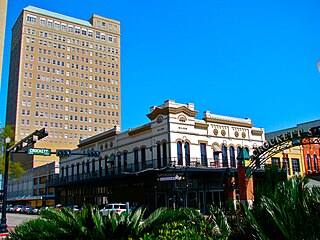
The Beaumont Commercial District is located in Downtown Beaumont, Texas. The district consists of various styles of buildings, including 6 highrises built before 1932. The district is registered on the National Register of Historic Places as a U.S. Historic District. The historic district is roughly bounded by Willow, Neches, Gilbert and Main Streets. The Old Spanish Trail travels through Downtown on Willow, Park, Pearl and College Streets.

Democrat Building is a historic building located in downtown Davenport, Iowa, United States. It was individually listed on the National Register of Historic Places in 1983. In 2020 it was included as a contributing property in the Davenport Downtown Commercial Historic District. The historic newspaper building is now an apartment building known as The Democrat Lofts.

Central Office Building is a historic building located in downtown Davenport, Iowa, United States. It has been individually listed on the National Register of Historic Places since 1983. In 2020 it was included as a contributing property in the Davenport Downtown Commercial Historic District. It is located in the center of a block with other historic structures. It now houses loft apartments.

The H. J. Heinz Company complex, part of which is currently known as Heinz Lofts, is a historic industrial complex in the Troy Hill neighborhood of Pittsburgh, Pennsylvania. The buildings were built by the H. J. Heinz Company from 1907 through 1958. The complex is listed on the National Register of Historic Places (NRHP) and five of the buildings are listed as a Pittsburgh History and Landmarks Foundation Historic Landmark.

The Union Arcade is an apartment building located in downtown Davenport, Iowa, United States. The building was individually listed on the National Register of Historic Places in 1983 by its original name Union Savings Bank and Trust. Originally, the building was built to house a bank and other professional offices. Although it was not the city's largest bank, and it was not in existence all that long, the building is still associated with Davenport's financial prosperity between 1900 and 1930. From 2014 to 2015 the building was renovated into apartments and it is now known as Union Arcade Apartments. In 2020 it was included as a contributing property in the Davenport Downtown Commercial Historic District.
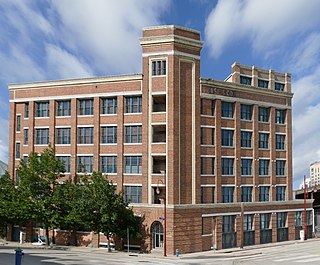
The National Biscuit Company Building, located at 15 North Chenevert in Houston, Texas, was built for Nabisco in 1910, and listed on the National Register of Historic Places on February 20, 1998. The structure was converted to apartments and is now known as City View Lofts.
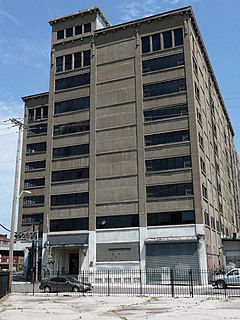
The Ridenour-Baker Grocery Company Building in Kansas City, Missouri is a commercial building constructed in 1910 by the Ridenour-Baker Grocery Company. It was the first wholesale grocery building west of the Mississippi River to be located on the path of a railway, where goods could be shipped into it directly. The building was listed on the National Register of Historic Places in 2014.






















